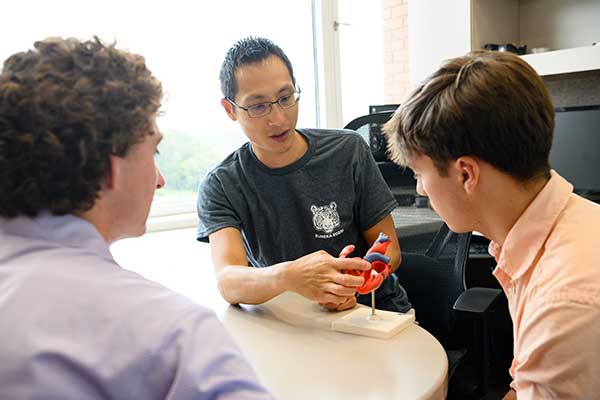Competencies and Learning Outcomes
Clemson Honors students engage in experiences that challenge them to think deeply, lead with purpose and make a difference. To guide this journey, the Honors College has developed Competencies and Learning Outcomes that shape both Honors courses and experiential learning opportunities.
These outcomes provide faculty with a framework to design meaningful learning experiences, whether in dedicated Honors courses or Honors-designated sections of discipline-specific classes. Faculty are encouraged to integrate at least one learning outcome and one related activity or assessment into their course design.
By aligning courses with these outcomes, faculty help Honors students build the skills and perspectives that define the Clemson Experience — preparing them to lead, serve and thrive far beyond the classroom.

Honors Competencies
Competency 1: Critical Thinking and Intellectual Risk Taking
Evaluate ideas and explore novel approaches through analysis, creativity, and informed judgment.
- Learning Outcome 1: Identify assumptions, biases and gaps in arguments while considering alternative viewpoints
- Learning Outcome 2: Compare failure and/or uncertainty with opportunities for growth, creativity and/or innovation
- Learning Outcome 3: Pursue ambitious, unconventional ideas and projects
Competency 2: Interdisciplinary Thinking
Synthesize knowledge from multiple disciplines and viewpoints and understand the value and potential of an interdisciplinary lens.
- Learning Outcome 1: Integrate methods, frameworks and knowledge from multiple disciplines
- Learning Outcome 2: Design and implement projects that reflect interdisciplinary synthesis
- Learning Outcome 3: Work productively in interdisciplinary teams to analyze ideas, evaluate arguments and consider courses of action
Competency 3: Solving Pressing Challenges
Demonstrates the ability to apply interdisciplinary knowledge and innovative problem-solving skills to address important issues.
- Learning Outcome 1: Connect academic disciplines with real-world applications
- Learning Outcome 2: Design and evaluate innovative solutions that address challenges at local, national, or global levels
- Learning Outcome 3:Reflect critically on societal, ethical and cultural aspects of the challenge and proposed solutions
Competency 4: Self-Directed Learning and Intellectual Leadership
Demonstrate autonomy in learning and goal setting through reflection, initiative, and personal growth. Cultivates intellectual leadership by engaging others, sharing knowledge and contributing insights.
- Learning Outcome 1: Define academic, professional and personal goals through self-directed assessment, reflection and exploration supporting experiential and leadership-based learning
- Learning Outcome 2: Demonstrate initiative by identifying and pursuing unique research, creative opportunities, leadership roles or other hands-on learning experiences
- Learning Outcome 3: Translate intellectual leadership into impact by mentoring peers, facilitating collaboration or contributing original perspectives that inspire others and emphasize student-driven innovation and leadership
Competency 5: Sense of Community and Wellness
Cultivate an awareness of self and society to act with purpose; build community, make friendships and value interpersonal connections.
- Learning Outcome 1: Consider and articulate diverse perspectives, including those that differ from one’s own, within broader social, cultural and academic contexts
- Learning Outcome 2: Demonstrate the ability to form and maintain meaningful interpersonal relationships and actively engage in community-building activities that foster a supportive and inclusive community
- Learning Outcome 3: Identify goals and implement strategies that promote personal wellbeing across multiple dimensions
